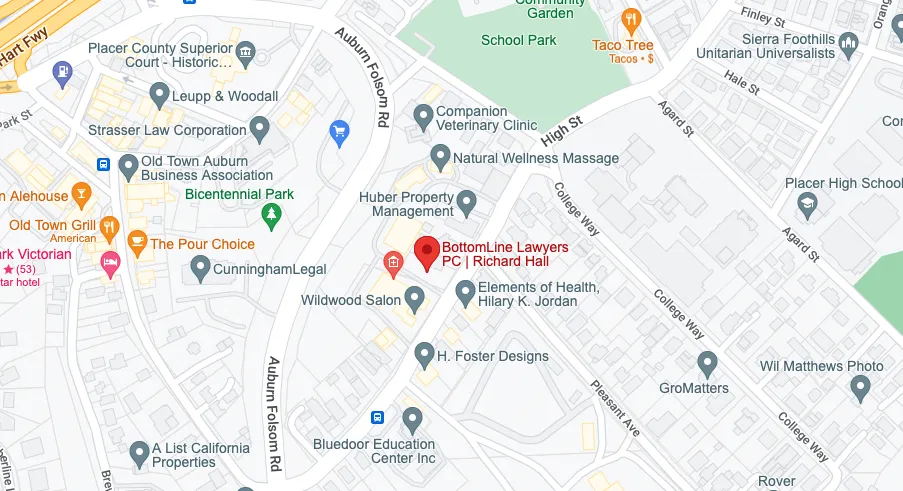LGBTQ+ Bankruptcy Attorneys Serving Auburn, California

If you have a large amount of debt and no way to repay it, you may discover that bankruptcy is your best alternative. Bankruptcy is a legal remedy available to those who have accumulated so much debt that there is no way to repay it in full. One of the several types of bankruptcy filings will be the proper one for you. You will be able to confront the issue confidently and move forward with your life with the assistance of one of our knowledgeable Auburn LGBTQ bankruptcy attorneys at Bottomline Lawyers.
Why Do You Need an LGBTQ Bankruptcy Attorney in California?
Our experienced LGBTQ bankruptcy attorneys can assist you in avoiding the risks associated with declaring bankruptcy on your own. Through our legal advice, our experienced CA bankruptcy lawyers can guarantee that:
- Answers to all your queries concerning bankruptcy
- Your documentation is thorough and accurate.
- You file the appropriate form of bankruptcy.
- You take all the necessary steps to complete your case effectively.
- You give all required information to your creditors, the court, and the trustee.
- You correctly understand everything you’re signing.
- Your property is safeguarded to the maximum degree permitted by law.
What Are the Dangers of Filing Bankruptcy Without the Help of Our LGBTQ Attorneys?
- Your case might be repeatedly rejected for incorrect document submission, resulting in several filing fees.
- You may be required to make several journeys to the trustee or even the judge, causing you to miss work. If you make significant errors, you may lose the opportunity to bring another lawsuit.
- You risk losing your bankruptcy discharge, which eliminates your debt.
- You may be accused of fraud and perjury.
What Constitutes Bankruptcy?
How Does Bankruptcy Benefit Creditors?
- How much you make
- Who you owe and how much you owe
- Every piece of property you possess
- If you’ve sold or given away property
- Where you do your banking
- If you have a safe deposit box or storage space
- Whether a lawsuit has been initiated against you
How Would You Know If Declaring Bankruptcy is the Best Choice?
What Are the Different Bankruptcy Options Available for LGBTQ+ Members in California?

A bankruptcy filing is a difficult choice. Consultation with our skilled LGBTQ bankruptcy attorneys can assist you in selecting the best course of action for your unique case. The following are some of the bankruptcy options available to you:
Chapter 7 Bankruptcy
Chapter 7 bankruptcy filings provide the discharge of unsecured bank loans or credit cards, the cessation of harassing collection calls, the elimination of past-due medical bills, certain taxes, and court judgments, the end of wage garnishments, and the release of frozen bank accounts. However, not everyone is eligible for this sort of bankruptcy. One of our professional Auburn LGBTQ bankruptcy attorneys from Bottomline Lawyers can help you determine your eligibility.
Chapter 11 Bankruptcy
Chapter 11 is primarily for businesses and enables you to prevent the foreclosure of valuable real estate property long enough to either sell or develop the property, obtain protection from creditors and tax levies, reduce monthly operating expenses, restructure debt into a more manageable form, and stop creditor collection calls.
Chapter 13 Bankruptcy
Chapter 13 lets you reorganize your debt to a more manageable amount that you may pay off in three to five years, and it stops pestering collection calls.
Same-Sex Issues in Bankruptcy
Same-sex couples endure double standards in virtually every aspect of life, and the gay, lesbian, bisexual, transgender, and queer (“LGBTQ”) population has unequal legal rights at every turn.
Our legal office proudly and professionally assists LGBTQ clients in Chapter 7, Chapter 11, and Chapter 13 bankruptcy procedures. Typically, the challenges in this area are comparable to those of “traditional” families, but the solutions are not always as evident.
Can a Same-Sex Couple File for Joint Bankruptcy?
The bankruptcy laws treat all individuals in this group equally. Unmarried heterosexual or homosexual couples cannot file a joint bankruptcy petition. The answer remains the same even if you have been together for many years, own joint property, and have common obligations. A lawful marriage is required to submit a joint petition.
What About a Married Same-Sex Couple?
In the case of Obergefell v. Hodges, the United States Supreme Court ruled that the Fourteenth Amendment compels all states to allow same-sex couples to marry and to recognize legal same-sex marriages performed in other states.
This ruling declared the Defense of Marriage Act (DOMA) of 1996 unconstitutional. DOMA was a federal statute that permitted states to refuse to recognize same-sex marriages even if the couple was legally married in another state.
Consequently, LGBT couples may now have same-sex marriage, file joint federal income tax returns as married couples, and get all the advantages and legal protections of marriage.
What effect does this have on bankruptcy law? Same-sex married couples may file a joint bankruptcy petition.
Is the Means Test Calculated Differently for Couples of the Same Sex?
No, the means test calculation determining eligibility to petition for Chapter 7 Bankruptcy applies the same group of variables regardless of a couple’s sexual orientation.
Is a Same-Sex Partner’s Income Included in the Means Test?
If the same-sex couple is married, both partners’ incomes will factor into the computation. Alternatively, if the same-sex couple is not married but lives together as domestic partners, only the non-filing partner’s share of household costs will be factored into the computations.
There is no difference in the means test computations for same-sex couples and heterosexual domestic partners.
How to File for Bankruptcy in California If You're an LGBTQ Member?
The specifics of the bankruptcy filing procedure vary depending on the kind of bankruptcy you qualify for or choose to declare. You must adhere to the following fundamental processes regardless of which route you select.
Collect Documents
Before making any bankruptcy decisions, analyzing all the relevant data is essential. To accomplish this, you must gather all the documentation you possess about your financial condition. If experts manage your financial information, get copies of your records from them.
You may also find this information in your retained mail and on companies’ websites. Look for documents with the following information:
- Verification of earnings, such as tax returns and pay stubs
- Documentation of expenditures, such as utility bills and rental receipts
- Credit card statements and other debt-related account statements
- Detailed asset information, including 401(k) and investment statements
Evaluate the Need for Filing Bankruptcy
When you discover that you are struggling to make ends meet, bankruptcy may be your first thought. However, there may be alternative possibilities that are worth investigating. For some individuals, reducing spending addresses their financial difficulties. The sale of assets is another alternative.
In other cases, individuals pursue debt consolidation or debt settlement. People with excellent credit frequently benefit from debt consolidation, while those with poor credit may consider debt settlement. Consult with one of our seasoned Auburn LGBTQ bankruptcy attorneys to determine whether these options suit you.
Recognize Your Bankruptcy Possibilities
If you elect to file for bankruptcy, you may have to pick between three primary choices. Here is some basic information to assist you in making your decision:
Chapter 7 Bankruptcy
This option, sometimes known as liquidation bankruptcy, is the most popular. Note that some assets are exempt and may be saved from the process of liquidation.
Chapter 13 Bankruptcy
Often referred to as the reorganization plan, this might help you design a repayment plan to maintain your home while making payments for three to five years.
Chapter 11 Bankruptcy
This is similar to Chapter 13, except it is designed for individuals and corporations with greater-than-average debt loads.
Participate in Debt Counseling
Before filing for bankruptcy in California, you must finish a required counseling course. Ensure that the institution offering the course is credible and approved.
Submit a Claim
Some forms are self-explanatory and straightforward to complete, but not all. In California, for instance, districts may have their own Chapter 7 forms. Working with a specialist is recommended if you have a complex financial situation.
Several variables may increase complexity. For example, you may split assets with a non-bankruptcy-filing spouse or business partner. There is also a filing cost. However, some individuals may have this price waived.
Work With a Reliable Trustee
A trustee is assigned to the case after filing a bankruptcy petition. You may need to mail the individual the documentation you acquired at the beginning of this procedure. Generally, bankruptcy filers are compelled to comply with a trustee’s requests. Thus it is usually advisable to comply.
The trustee examines the provided papers to confirm the application’s information is accurate. They also contribute to the fairness of the bankruptcy procedure.
Attend the Court Hearing
After the trustee has completed the review, you will be provided with a court date. You must verify your Social Security number and identity for this hearing. The trustee may have many follow-up questions on the given information.
Your creditors receive hearing invitations, but they seldom attend. Creditors are more inclined to come if the debt burden is substantial or if they suspect fraudulent activity. Those who are present may ask questions.
Follow the Court’s Decision
After the hearing, the court issues its final determination regarding the bankruptcy petition. This is nearly the end of the road for those who declare Chapter 7 bankruptcy. Assets are liquidated, and the process of reconstruction commences.
People who apply for reorganization bankruptcy must maintain payment compliance for up to five years. Failure to comply may result in the loss of bankruptcy protections or allowances.
Attend a Second Class on Debt Counseling
There is usually no requirement to finish this course once the debt has been forgiven. Some people complete this before attending the hearing to avoid complications. Remember that it is obligatory and that you must file a 423 form with the court to tell them it has been completed.
This course teaches financial management fundamentals. The overall objective is to ensure that you never have to file for bankruptcy again.
Continue Onward
Whether your debts are forgiven immediately, or after three to five years, the final stage is to move on. Regaining the confidence of creditors may take time but is not impossible. Many individuals revert to cash-based budgeting and utilize secured credit cards to improve their credit ratings and regain financial stability.
To reach this stage, you may require legal assistance. Our competent LGBTQ bankruptcy attorneys are a phone call away. We’re here to assist and safeguard the possessions you’ve worked so hard to acquire. We collaborate with you to develop a plan tailored to your needs. Call Bottomline Lawyers to find out what option you qualify for and how to proceed.
What Can Filing for Bankruptcy Do?
Individuals battling with debt might eliminate some commitments and start over via bankruptcy. The two most common types of bankruptcy, Chapter 7 and Chapter 13, provide distinct advantages and, in certain instances, approach debt and property differently. Your appropriate chapter will depend on your income, assets, and objectives.
Bankruptcy Can Stop Creditor Harassment and Collection Efforts
Upon filing, the court issues an order known as an automatic stay. The stay prevents most calls from creditors, wage garnishments, and lawsuits, but not all. For example, creditors can still collect child support, and criminal proceedings will continue.
Bankruptcy May Temporarily Prevent Foreclosure, Repossession, and Eviction
The automatic stay will prevent these acts while they are pending. Once completed, bankruptcy is useless.
Bankruptcy Can erase Credit Card Debt and Most Other Non-Priority Unsecured Debts.
Most unsecured, non-priority obligations, excluding student loans, are eliminated through bankruptcy. For example, you can discharge unsecured credit card debt, medical bills, past-due utility payments, personal loans, and even gym membership contracts.
The debt is unsecured if you did not guarantee to return the acquired property if you did not pay the charge. However, if you have a secured credit card, you will be required to return the goods. Typically secured debts include jewelry, electronics, computers, furniture, and major appliances. Check the receipt or credit agreement for details.
Bankruptcy Can Eliminate Secured Debt
You can eliminate the obligation through bankruptcy if you cannot afford a secured payment, such as a mortgage or vehicle loan. However, you will not be allowed to keep the home, vehicle, computer, or other goods used as collateral for the loan.
If you deliberately agree to secure a loan with property, you must either repay the obligation or return the property.
What Can't a Filing for Bankruptcy Do?
Bankruptcy doesn’t fix all debt troubles. What it cannot accomplish for you is as follows.
Bankruptcy Does Not Stop a Secured Creditor From Repossessing or Foreclosing on Your Property
A bankruptcy discharge eliminates debts, but it doesn’t eliminate liens. A lien gives the lender the right to seize property, sell it at auction, and apply the proceeds to the debt sum. The lien remains until the obligation is paid in full. If you have a secured debt in which the creditor has placed a lien on your property, bankruptcy might release you from the duty to repay the debt.
However, bankruptcy will not remove the lien from the property; the creditor can still retrieve the collateral. For instance, you can discharge your mortgage if you file under Chapter 7. However, the mortgage will stay on the property. As long as the mortgage is due, the lender can use its lien rights to foreclose on the property once the automatic stay is lifted, as long as the mortgage stays unpaid.
Bankruptcy Doesn’t Erase Student Loans Unless Under Restricted Conditions.
Bankruptcy may only cancel student debts if you demonstrate that repaying the loan will cause you “undue hardship,” a highly stringent criterion. You must explain that you cannot afford to repay your loans and that it is unlikely that you will be able to do so in the future.
Bankruptcy Doesn’t Remove Most Tax Debts.
It is not simple to eliminate tax debt through bankruptcy, although it is occasionally achievable for older unpaid tax arrears.
Other Non-dischargeable Debts Survive a Bankruptcy Filing
The debts listed below cannot be discharged under either chapter:
- Unless the creditor learns of your bankruptcy case, creditors are not obligated to forgive any debts you exclude from your bankruptcy filing.
- Debts for injuries or deaths caused by intoxicated driving
- Fines and penalties are imposed as punishment, such as traffic tickets and restitution for criminal acts.
If you apply for Chapter 7, these debts will stay after the conclusion of your case. You will return these obligations in full through your Chapter 13 repayment plan.
Bankruptcy Can’t Eliminate Debt Related to Fraud.
If a creditor brings an adversary process lawsuit and convinces the judge that the debt should survive your bankruptcy, bankruptcy will not discharge a fraud-related debt. Such debts may come from providing false information on a credit application or using the borrowed property as security for a loan.
Consult Our Auburn LGBTQ Bankruptcy Attorneys Today
If you cannot manage your debt, there are legal options available. Our law firm’s LGBTQ bankruptcy attorneys are qualified and experienced lawyers who assist the Auburn community.
We take pleasure in catering to the requirements of the LGBTQ community and being attentive to the specific difficulties our LGBTQ clients face.


